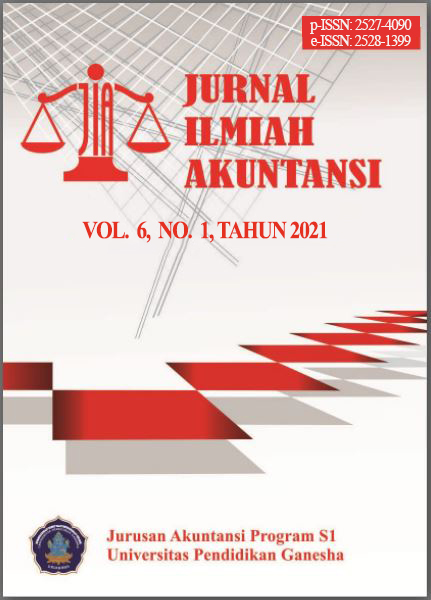Tekanan, Kesempatan, dan Rasionalisasi Pemicu Tindakan Kecurangan (Fraud) pada Perusahaan
DOI:
https://doi.org/10.23887/jia.v6i1.31540Keywords:
fraud, opportunity, pressure, rationalizationAbstract
The purpose of this study is to determine the effect of pressure, opportunity, and rationalization on fraud. The research design is causal quantitative research. The sample of this study was determined by purposive sampling technique by 42 respondents. Data collection methods used were questionnaire and interview. Data analysis techniques using multiple linear regression analysis. As for the results of this study show that (1) the pressure, opportunity, and ratinalization have a positive and significant effect on fraud. (2) Pressure has a positive and significant effect on fraud. (3) The opportunity to have a positive and significant effect on fraud. (4) Rationalization has a positive and significant effect on fraud.References
Albrecht, W. S., Albrecht, C. O., Albrecht, C. C., & Zimbelman, M. F. (2012). Fraud Examination. South-Western Cengage Learning. Mason, OH.
Apriadi, R. N., & Fachriyah, N. (2014). Determinan Terjadinya Fraud di Institusi Pemerintahan. Jurnal Ilmiah Mahasiswa FEB, 3(1).
Arifianti, R., Santoso, B., & Handajani, L. (2015). Perspektif Triangle Fraud Theory Dalam Pengadaan Barang/Jasa Di Pemerintah Provinsi NTB. InFestasi (Jurnal Bisnis Dan Akuntansi), 11(2), 195–213.
Fitri, F., & Nadirsyah, N. (2019). Pengaruh Tekanan (Pressure), Kesempatan (Opportunity), Rasionalisasi (Rationalization), Dan Kapabilitas (Capability) Terhadap Kecurangan Pengadaan Barang/Jasa Di Pemerintahan Aceh Dengan Pemoderasi Budaya Etis Organisasi. Jurnal Ilmiah Mahasiswa Ekonomi Akuntansi, 4(3), 412–427.
Karyono, D. (2013). Forensic Fraud. Yogyakarta: Andi Offset.
Lailiyah, A. (2016). Variabel-Variabel Yang Berpengaruh Terhadap Kecurangan (Fraud) Di Sektor Pemerintahan: Persepsi Pegawai Bidang Keuangan Di Lingkungan Pemerintah Kabupaten Situbondo.
Lestari. (2017). Pengaruh Opportunity, Pressure, Rationalization, Dan Perilaku Tidak Etis Terhadap Kecenderungan Terjadinya Kecurangan (Studi Empiris Pada Hotel ABC Denpasar). E-Journal S1 Akuntansi Universitas Pendidikan Ganesha.
Marliani, M., & Christiawan, Y. J. (2016). Persepsi Pengaruh Fraud Triangle Terhadap Pencurian Kas. Business Accounting Review, 4(1), 21–30.
Molida, R., & Chariri, A. (2011). Pengaruh Financial Stability, Personal Financial Need Dan Ineffective Monitoring Pada Financial Statement Fraud Dalam Perspektif Fraud Triangle. Universitas Diponegoro.
Mustikasari, D. P. (2013). Persepsi Pegawai Dinas Se-Kabupaten Batang Tentang Faktor-Faktor Yang Mempengaruhi Kecurangan (Fraud). Universitas Negeri Semarang.
Perols, J. L., & Lougee, B. A. (2011). The relation between earnings management and financial statement fraud. Advances in Accounting, 27(1), 39–53.
Purwanto, E., Mulyadi, J. M. V., & Anwar, C. (2017). Kajian Konsep Diamond Fraud Theory Dalam Menunjang Efektivitas Pengadaan Barang/Jasa Di Pemerintah Kota Bogor. Jurnal Manajemen Indonesia, 17(3), 149–162.
Sihombing, K. S., & Rahardjo, S. N. (2014). Analisis Fraud Diamond Dalam Mendeteksi Financial Statement Fraud: Studi Empiris Pada Perusahaan Manufaktur Yang Terdaftar Di Bursa Efek Indonesia (BEI) Tahun 2010-2012. Fakultas Ekonomika dan Bisnis.
Suryandari, N. P. E., & Julianto, I. P. (2019). Pengaruh Tekanan, Kesempatan, Rasionalisasi (Triangle) Dan Efektivitas Penerapan Pengendalian Internal Terhadap Tindak Kecurangan (Fraud)(Studi Pada LPD Se-Kecamatan Negara). JIMAT (Jurnal Ilmiah Mahasiswa Akuntansi) Undiksha, 10(1).
Susandra, F., & Hartina, S. (2018). Analisis Faktor-faktor yang Mempengaruhi Kecenderungan Fraud pada Satuan Kerja Perangkat Daerah (SKPD) di Kota Bogor. Jurnal Akunida, 2(2), 63–83.
Tjahjono, S., Tarigan, J., Untung, B., Efendi, J., & Hardjanti, Y. (2017). Business Crimes and Ethics-Konsep dan Studi Kasus Fraud di Indonesia dan Global Edisi Kesatu. Yogyakarta: Andi. Bandung.
Tuanakotta, T. M. (2010). Akuntansi Forensik dan Audit. Jakarta: Salemba Empat Investigatif.
Zahara, A. (2017). Pengaruh Tekanan, Kesempatan Dan Rasionalisasi Terhadap Tindakan Kecurangan (Fraud)(Survei pada Narapidana Tipikor di Lembaga Pemasyarakatan Kelas II A Kota Pekanbaru). Jurnal Akuntansi, 5(2).



1.png)


